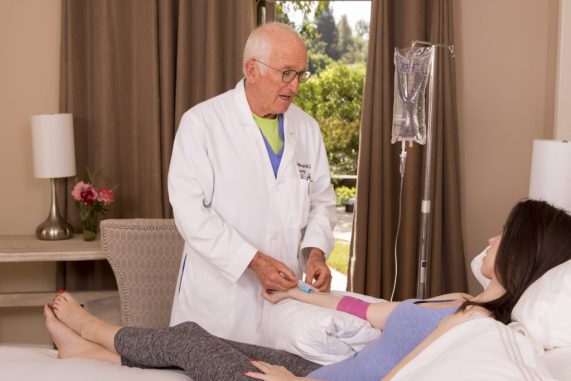Novo Detox is a treatment center with a detox and inpatient rehab facility that The Joint Commission fully accredits, the California Department of Health Care Services, and the Substance Abuse and Mental Health Services Administration (SAMHSA).
We are the best detox and rehab center for addiction for San Francisco, California residents because we have a full staff of caring and empathetic, dedicated experts available to our patients 24 hours a day, 365 days a year. Our drug and alcohol detox and rehabilitation programs have a high recovery rating, with our patients avoiding the ping-pong effect.
Our Gallery
Why patients choose detox & rehab programs at Novo?
Focus on safety & comfort
24/7 supervised detox
Top Rated facility
Effective treatment
Healthy meals
Quick admissions
Evidence-based Therapy
Great locations Nationwide
Top Rated Alcohol Detox Program in San Francisco
Once you (or a loved one) are ready to tackle your alcohol addiction, you may need to go to alcohol detox before you attend an inpatient rehab or outpatient program. Once you’ve been using alcohol for long enough, your body demands it just to get through the day. Going to a safe, medically assisted detox is your first step on the journey to living free from alcohol abuse.
When you’re ready to treat your alcohol use disorder and looking for somewhere to detox safely, you should also look into a treatment facility that can assist you with ongoing levels of care after you’ve made it past alcohol withdrawal. You may need residential in-patient treatment, partial hospitalization, or an intensive outpatient program.
Alcohol addiction treatment is best with both individual therapy and group sessions, and you may also want to try holistic therapies such as meditation, yoga, acupuncture, detox massages, and the like. You may also be interested in a telehealth or virtual care, especially if you’re concerned about your job or making appointments without taking time off from work or school – once you’ve safely detoxed from alcohol.
Whether you’re considering residential treatment or an intensive outpatient program in San Francisco CA, the detox center that works for you should be able to quickly admit you and keep you comfortable. Look for expert clinical staff that’s also knowledgeable about the dual diagnosis for those with mental health issues.
Some 12-step groups frown on medication. However, you may need it for a safe detox and to potentially help you manage the rest of your life, especially if you have a dual diagnosis. Not all meds affect people in the same way. A detox that customizes medicines and therapy based on your own genetics and physical health can help you better than a cookie-cutter program that doesn’t consider these facts. Cutting-edge science and 24/7 medical staff at your detox facility help you manage your alcohol withdrawal in comfort.

What Is Alcohol Detox Like?
Detoxing from alcohol is the first step for many people in treating their alcoholism. Because alcohol acts as a depressant, over time your brain changes the way it makes some of its chemicals because it comes to relying on the booze instead.
Typically, after drinking for a while, your brain produces more GABA, a brain chemical that makes you feel calm or euphoric, and less glutamate, which makes you feel excitable. When you stop drinking, your brain can’t automatically correct the imbalances, which can have various effects on you for a while.
When you’re at this stage, it will take a little time for the alcohol to be completely flushed from your body and to get past the withdrawal symptoms. Detox is a managed process where you stop drinking and allow your body and brain to clear out the effects of the alcohol. Some of the withdrawal symptoms can be severe, especially for those who’ve been drinking hard or for a long time (or both), so it’s a bad idea to go cold turkey and try to white-knuckle your way through it. Some alcohol withdrawal symptoms can occur without warning and can change even within a 24-hour period. Going through a medically supervised detox ensures that someone looks out for you if your symptoms change or you just need some support.
What type of detox you need is best determined by a medical professional. They’ll give you tests (blood, urine, and/or breath) to determine how much alcohol you have in your body when you get to the recovery center and how severe your addiction might be. This initial assessment also considers your current mental state and any other illnesses or medical issues you might have so that they can create a treatment plan for you, including your detoxification.
In addition to how long and how heavily you’ve been drinking, your need for detox can also be influenced by a family history of alcoholism or substance abuse, childhood trauma, stress levels, any co-occurring mental health issues or co-occurring addictions in addition to the alcohol.
What to Expect During Detox?
Although everyone’s detox is slightly different, withdrawal symptoms often start just two hours after the last drink. The worst symptoms usually clear after a week, but others can last a bit longer.
6-12 hours
Milder symptoms like irritability, tremors, nausea, and headaches can occur. Typically, they’ll worsen for a bit before they get better.
Day 1
After the first 12 hours, symptoms can be more severe, such as disorientation, shaking in your hands, and seizures.
Day 2
Typically, symptoms keep worsening, and you may develop hallucinations and panic attacks. Your body is still getting rid of alcohol.
Days 3-7
During this time, you’ll find that various withdrawal symptoms come into play but also tend to stop. This is a critical time for more severe issues, such as seizures and delirium tremens (“DTs”). If you have a severe addiction, you must have some medical support 24/7 because the more serious symptoms can arrive with no warning.
After the first week
Most of the physical issues start tapering off at this point, and the ones that may persist a bit longer tend to be minor ones like insomnia and headaches. However, some people do experience prolonged symptoms known as PAWS – post-acute withdrawal syndrome, which can last for a few weeks or months. Typically those with PAWS have low energy, anxiety, insomnia, and delayed reflexes.
How Long Is Detox?
Depending on your personal circumstances, you can expect to spend at least one week, maybe two, in detox. Early in the detox, your risk of relapse is moderate but increases over time. Especially as your symptoms start to get worse. The relapse risk is high up to five days after your last drink. In the later stages, after a week, you’ll typically receive more therapy and attend support groups to help ease your transition to rehab, whether outpatient or inpatient.
State-of-the-art medical detox services with professional staff can keep you comfortable and also help you maintain (or regain) a sense of dignity, even with unpleasant withdrawal experiences. Using a holistic approach, which a top-rated alcohol detox program in San Francisco should offer, helps you manage all your symptoms in addition to medication and other traditional therapies.
Symptoms of Alcohol Detox
They vary and often depend on how long you’ve struggled with alcohol use disorder. Those who have been drinking heavily for years are likely to be more dependent on alcohol, and their withdrawal symptoms are often more severe than for those who haven’t been drinking as hard or as long.
You may be concerned about withdrawal, and you’re definitely not the first one who’s been leery of getting sober due to fear of withdrawals. That’s where a customized, medically assisted detox comes in to help you be as comfortable as possible while you’re detoxing.
Some of the mild withdrawal symptoms include things like:
- Sweating
- Headaches
- Nausea
- Insomnia (both having a hard time getting to sleep and also staying asleep)
- Anxiety or nervousness
If you have a more severe alcohol use disorder, you may experience some of the following:
- Tremors, which can start in the hands but end up shaking the whole body.
- Disorientation can confuse you about what time it is, where you are, and even who you are.
- Hallucinations can be visual, where you see things that aren’t really there, or auditory where you hear things that aren’t really there.
- Seizures
- Delirium tremens, which is rare but can be life-threatening. This usually progresses from less severe symptoms and can include aggression and agitation, confusion, impaired consciousness, and grand mal seizures, which may cause muscle contractions and loss of consciousness. DTs can also be expressed in severe sweating, shaking, vomiting, and rapid heartbeat. Hallucinations are also possible, as is heart failure.
Acute Detox
This type of detox is for those with serious alcohol use disorders because withdrawal can be life-threatening. Patients in acute detox need 24/7 monitoring by medical staff at an inpatient treatment facility. You have a higher risk of respiratory failure, meaning that you stop breathing and other potentially fatal side effects, including seizures.
Sub-Acute Detox
If you don’t need acute detox but still require some supervision during your alcohol withdrawal, you may be able to detox in an outpatient setting. This could include a residential treatment facility or an intensive outpatient program. Sub-acute detox may be for you if you haven’t abused alcohol for as long or didn’t drink as heavily and you’re otherwise in good health.
Why Choose Novo Detox for Alcohol Detox Near Me?
Whether acute or sub-acute detox is the right plan for you, we treat the whole person at our sober living housing in San Francisco. In addition to the medications determined based on your genetic and physical profile, we also offer nutritional counseling and organic, fresh foods, juices, and smoothies. We have saltwater therapy and other holistic therapies such as yoga, meditation, reflexology, Qi-Gong, and tai chi.
Because we are a small detox facility, we can personalize your treatment plan for detox and further rehab. Novo Detox is accredited by the Joint Commission, California Department of Health Care Services, and SAMHSA (Substance Abuse and Mental Health Services Administration). Get the help you need and deserve to start enjoying an alcohol-free lifestyle.










